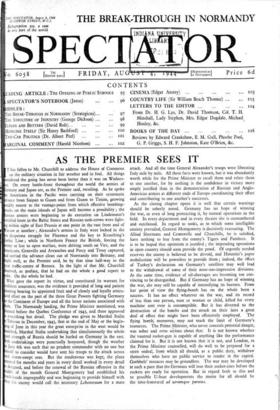AS THE PREMIER SEES IT
T has fallen to Mr. Churchill to address the House of Commons
on the military situation in fair weather and in foul.. All things nsidered the going has never been better than it was on Wednes- v. On every battle-front throughout the world the armies of ermany and Japan are, as the Premier said, recoiling. As he spoke e Americans in the Pacific were carrying on their systematic vance from Saipan to Guam and from Guam to Tinian, growing eadily nearer to the vantage-point from which effective bombing- tacks on the main islands of Japan will become a possibility ; the ussian armies were beginning to do execution on Lindemann's railed front in the Baltic States and Russian tank-crews were fight- g within sight of East Prussia at one point in the vast front and of 'arsaw at another ; Alexander's armies in Italy were locked in the st desperate struggle for Florence and the key to Kesselring's othic Line ; while in Northern France the British, forcing the my at last to open warfare, were driving south on Vire, and the mericans, Granville and Avranches and Percy and Tessy captured, d carried the advance clean out of Normandy into Brittany, and ight well, as the Premier said, be by that time half-way to the eat traffic-centre of Rennes. In the light of that Mr. Churchill served, as preface, that he had on the whole a good report to e. On the whole he had.
What gave the report its virtue, and constituted its warrant, for fident assurance, was the evidence it provided of long and patient lanning bearing its appointed fruit and of closely and loyally articu- ted effort on the part of the three Great Powers fighting Germany the Continent of Europe and all the lesser nations associated with em. The Normandy landing, the Prime Minister mentioned, was honed before the Quebec Conference of 1943, and there approved everything but detail. The pledge was given to Marshal Stalin t Teheran in December, 1943, that at the end of May or the begin- g of June in this year the great enterprise in the west would be unched, Marshal Stalin undertaking that simultaneously the whole t strength of Russia should be hurled on Germany in the east. th undertakings were punctually honoured, though the weather n June 6th was such that no prudent commander with no one but self to consider would have sent his troops to the attack across h storm-swept seas. But the rendezvous was kept, the plans lured for months and years in every detail worked in every detail designed, and before the renewal of the Russian offensive in the die of the month General Montgomery had established his h-heads impregnably and was beginning to provide himself with at his enemy would call the necessary Lebensraum for a mass attack. And all the time General Alexander's troops were liberating Italy mile by mile. All these facts were known, but it was abundantly worth while for the Prime Minister to recall them and relate them to one another, for by nothing is the confidence in victory more amply justified than in the demonstration of Russian and Anglo- American armies at different ends of Europe coordinating their effort and contributing to one another's successes.
As the closing chapter opens it is well that certain warnings should be soberly noted. Germany has no hope of winning the war, or even of long protracting it, by normal operations in the field. In every department and in every theatre she is outnumbered and outclassed. In regard to tanks, as to which some intelligible anxiety prevailed, General Montgomery is decisively reassuring. The Allied Shermans and Cromwells and Churchills, he is satisfied, have nothing to fear from the enemy's Tigers and Panthers. It is to be hoped that optimism is justified ; the impending operations in open country should soon provide the proof. Of urgently needed reserves the enemy is believed to be devoid, and Himmler's paper mobilisation will be powerless to provide them ; indeed, the effect of Turkey's declaration on Germany's satellites may well lead to the withdrawal of some of their none-too-impressive divisions. At the same time, evidence of oil-shortages are becoming too con- vincing to be disregarded. But if Germany has no hope of winning the war, she may still be capable of intensifying its horrors. From her point of view the flying-bomb has on the whole been a success. It has no effect whatever on the war, and its record of less than one person, man or woman or child, killed for every machine sent over is contemptible. But it has diverted to the destruction of the bombs and the attack on their lairs a great deal of effort that might have been offensively employed. The flying bomb; moreover, may not mark the limit of Germany's resources. The Prime Minister, who never conceals potential danger, was sober and even serious about that. It is not known whether• the vaunted rocket-gun is capable of anything like the performance claimed for it. But it is not known that it is not, and London, as the Prime Minister counselled, will do well to be prepared for a stern ordeal, from which all should, as a public duty, withdraw themselves who have no public service to render in the capital. Goebbels' menaces may be groundless. The war may be developed at such a pace that the Germans will lose their rocket-sites before the rockets are ready for operation. But in regard both to this and to possible U-boat developments the motto for all should be the time-honoured ad utrumque paratus.


























